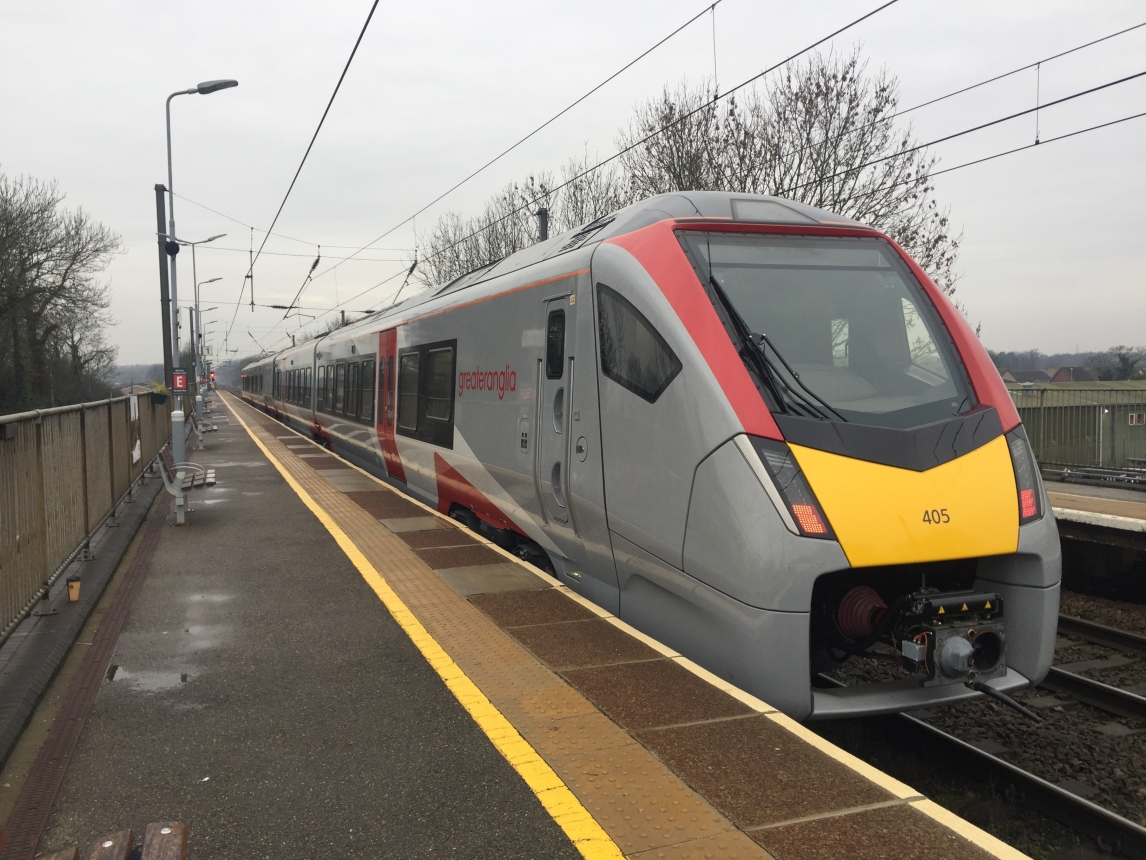Published on: Wednesday, 23 January 2019
Last updated: Tuesday, 12 February 2019
Watch out for Greater Anglia’s brand new trains – which are being tested in daylight on more routes in Norfolk, Suffolk and Essex from later this month.
Greater Anglia is replacing every single train with brand new state-of-the-art trains which will start to come into service in the middle of this year.
Testing has started on two of the trains which will replace existing diesel trains. So far, they have only run between Norwich and Great Yarmouth and Norwich and Diss.
Now they are due to travel further afield to check how they operate at different speeds and routes.
From Monday 28 January to Saturday 2 February, technicians are aiming to run tests on them as they travel on routes including from Norwich to Colchester and Ipswich and from Norwich to Thetford, as well as on the Norwich to Great Yarmouth line.
Night-time testing is continuing in February and March, between Norwich and Diss, as technicians check that the trains’ pantographs, which draw power from the overhead wires, are working correctly and also monitor the performance of the wheel sets – known as bogies.
Ian McConnell, Greater Anglia Franchising and Programmes Director, said: “The testing programme is going well and it’s now time to take the trains further afield to carry out some different tests. We have to test them for performance and safety before we can put them into passenger service.
“We’ve been very pleased with the great comments we’re getting from people who have spotted the new trains on the network who can see why we’re so excited about these trains, which will transform rail travel in East Anglia.
“We know people are excited to see our new trains, but please remember to keep yourselves and our railway staff safe if you’re taking photos, by standing behind the yellow line at stations and not using flash photography.
“Road-users in Norfolk should also be alert at level crossings as there will trains going past in the middle of the night and the early hours of the morning at times when they not used to the level crossing barriers being down.”
Martino Celeghini, technical project manager at Stadler, said: “We are now in the final stages of the production process for the bi-modes. Extensive testing is taking place in East Anglia, demonstrating the good progress that the project has made so far.
“With contracts signed less than three years ago, we are delighted that an increasing number of Stadler trains will be tested on the network over the next weeks.
“These trains will provide Greater Anglia passengers with a sneak preview of the new Stadler fleet, which will soon become an integral part of the UK rail landscape.”
The trains being tested are bi-modes, made by Swiss company Stadler. They switch between electric and diesel power and have many environmentally-friendly features.
The diesel engine, which is fitted into the middle of the trains, meets the latest, tighter, standards for emissions and is also quieter for passengers than existing diesel engines.
When the bi-mode trains are running underneath an electric line, they can switch to electricity mode and take advantage of electric energy rather than diesel.
As with other modern electric trains, energy created when braking under an electric line is put back into the overhead wires to be used by other trains to accelerate – further helping to save energy.
Even in diesel mode, the trains can brake electrically by using a “brake resistor”, which means there are less brake pads used so less dust is produced and released into the environment.
When running in diesel mode, the engines generate electricity for the motors enabling the train to accelerate more powerfully and smoothly.
All of Greater Anglia’s 169 brand new trains will be longer with more seats, USB and plug points, air conditioning, fast free wifi, accessible toilets and improved passenger information screens.
Stadler is making 58 new trains to replace existing diesel, intercity and Stansted Express trains and Bombardier, based in Derby, is making 111 electric commuter trains.



